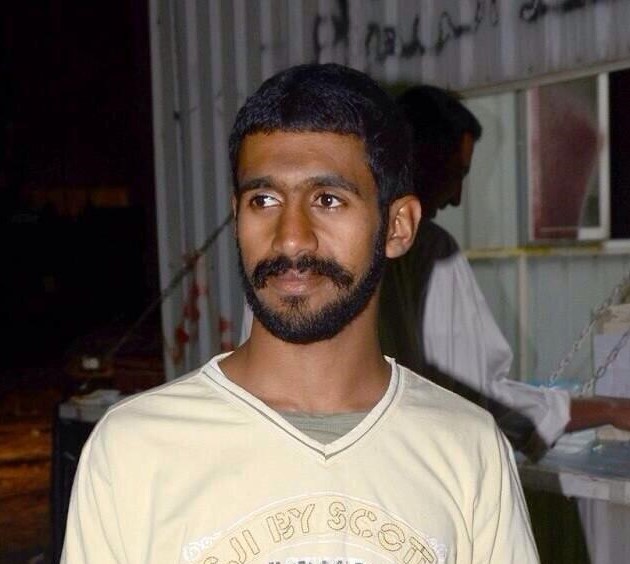Hasan Ahmed Radhi Mohamed was a recent high school graduate when Bahraini authorities arrested him in 2012. He has been subjected to human rights violations on multiple occasions, including torture and unfair trial when was charged in the case of establishing and joining a terrorist cell, the February 14 Coalition, as well as in other cases. He is currently serving his sentence at Jau prison and was recently placed in the isolation building with 13 of his fellow prisoners.
Hasan was arrested on 23 February 2012 from his house in the village of Eker. Riot police gathered around the perimeter of the house, and a group of them, accompanied by masked officers in civilian clothing and officers from the National Security Agency, raided the house. They roamed and searched it without presenting any search warrant. They pulled the detainee, dragged him, and forcibly pushed him out of the house, all without presenting an arrest warrant or stating the reason for the arrest. There were police cars as well as civilian cars. When the parents asked where he would be taken, the authorities did not give any answer. They told the family that they could follow them by car and when they did, the officers began to elude them so the family could not catch up with them. The family inquired as to the Hasan’s whereabouts at several police stations, but did not get any information indicating the presence of the detainee. He was disappeared for a period of seven to ten days, until his family received a call instructing them to take some clothes for him and deliver them to the detention prison in the town of Al-Hidd.
The investigation was held at the Criminal Investigations Directorate (CID), where he was beaten and tortured physically and psychologically beginning at his arrest and lasting throughout the investigation. His lawyer was prohibited from attending the interrogations. He was charged in three different cases. Initially, he was charged with illegal assembly and rioting. Afterwards, his family learned from what was published about the February 14 Coalition case, and that he was among the accused in this terrorist cell. He was charged with establishing and joining a terrorist cell in this case. And finally, he was charged with attempted murder in a third case related to terrorism. Hasan did not have adequate time and facilities to prepare for trial nor was he able to challenge evidence presented against him in trial. He was also denied meeting his attorney during the trials. He was sentenced to one year in prison in the case, fifteen years for the second, and fifteen years for the third charge resulting in a total sentence of 31 years. All charges were appealed within the legal period and all appeals were denied. The verdict was upheld in the February 14 Coalition case on 29 November 2017.
Afterwards, he was transferred to Jau prison, where some security officers repeatedly harassed him, which resulted in a broken arm. In addition, recently, on 10 August 2022, he and 13 other prisoners were dragged by force from their cells and transferred to the isolation building. The isolation building refers to one of the buildings within Jau Prison where prisoners are detained in cells with other individuals with whom they do not share a common culture, language, or religion. The prisoners held here refer to the practice as ‘isolation’ and claim that this is a tactic used by the prison authorities to make these individuals feel isolated without formally holding them in solitary confinement. During their transfer, Hasan injured his hand because of the handcuffs. During that time, officers committed various violations against the isolated prisoners. Hasan stated that he is being handcuffed when he goes out to breathe or call his family, and despite his objections to the administration, nothing has changed. Moreover, on 3 January 2023, officers punched, kicked, pepper sprayed, and stomped on their necks, in clear violation of international law. On the same day, Hasan’s family received a call stating that the date had been set for the visit on 4 January 2023. However, following the violent event, they received another call in the evening stating that the visit had been canceled. When they asked about the reason for canceling the visit, they were told that it had been canceled due to an administrative reason. The prisoners are also being sporadically denied their rights to communicate with their families and visitation rights. For instance, they remained for 45 days without being able to call their families, and despite complaints to the Ombudsman, these violations continue. On 12 January 2023, all 14 prisoners, including Hasan, were able to call their families after calls stopped for 10 days. This came after families of the prisoners contacted the office of the crown prince. As of this date, all 14 prisoners, including Hasan, remain isolated from the outside world since that time.
Hasan’s warrantless arrest, torture and unfair trial go against the Convention against Torture and Other Forms of Cruel, Inhuman or Degrading Treatment or Punishment (CAT) and the International Convention on Civil and Political Rights (ICCPR), both of which Bahrain is party to. Moreover, the countless violations that he faced during his imprisonment, including being placed in isolation, are violations of the United Nations Standard Minimum Rules for the Treatment of Prisoners (the Nelson Mandela Rules). As such, Americans for Democracy and Human Rights in Bahrain (ADHRB) calls on the Bahraini authorities to immediately release Hasan, who was denied a fair trial and due process rights and to investigate the allegations of torture and ill treatment and hold perpetrators accountable. Furthermore, ADHRB urges the relevant authorities to provide Hasan, as well as all prisoners, with their visitation rights and let his family communicate with them regularly and safely.





